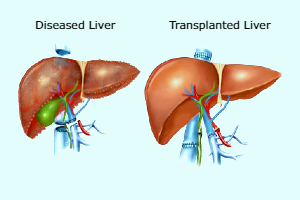Liver Transplant
Liver transplantation is a surgical procedure in which a diseased or damaged liver is replaced with a healthy liver from a donor. It is usually reserved for people with end-stage liver disease, liver cancer, or other severe liver conditions that cannot be managed with other treatments.
During the liver transplant procedure, the patient’s diseased liver is removed, and the healthy liver from the donor is implanted in its place. The new liver is then connected to the patient’s blood vessels and bile ducts to restore normal liver function.

Liver transplantation is a complex procedure that requires careful screening of both the donor and recipient, as well as close postoperative monitoring and lifelong immunosuppressive therapy to prevent rejection of the transplanted liver.
The success of liver transplantation depends on many factors, including the age and overall health of the recipient, the severity of their liver disease, and the quality of the donated liver. With proper care and management, many people who undergo liver transplantation are able to return to a normal, healthy life.
